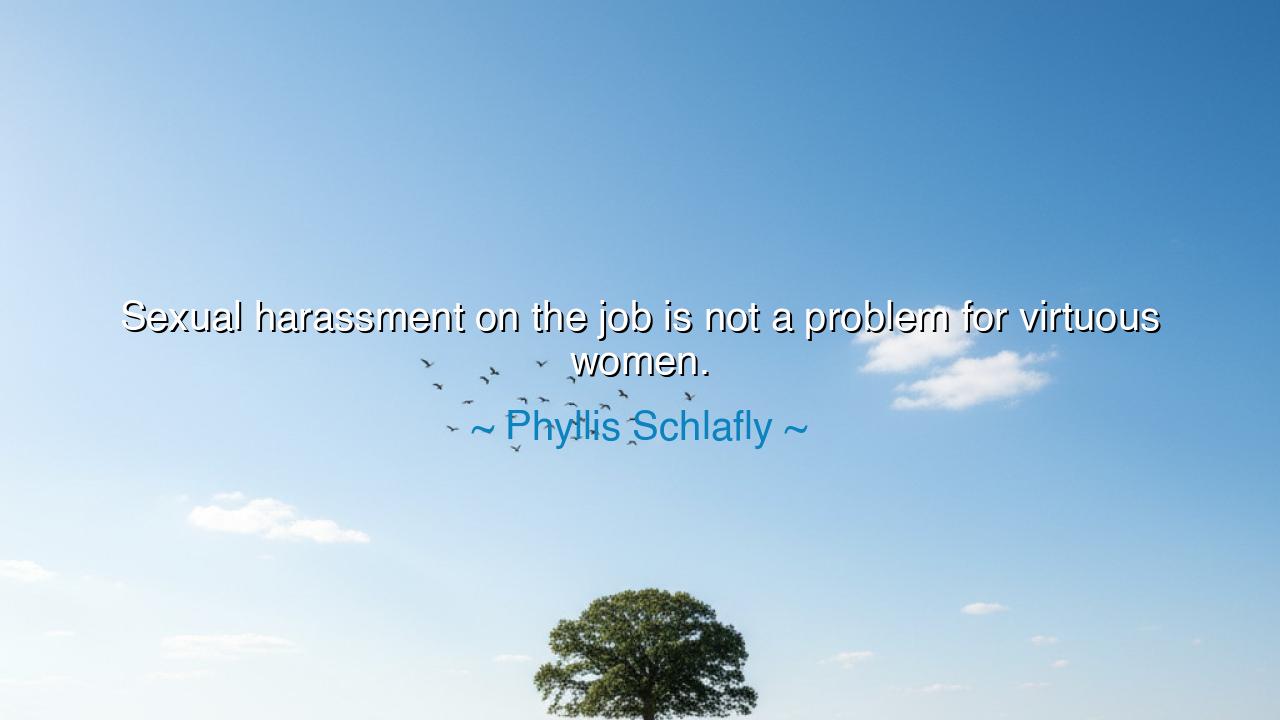
Sexual harassment on the job is not a problem for virtuous






O children of the future, hear the words of Phyllis Schlafly, whose beliefs echo the complex and painful realities of sexual harassment. "Sexual harassment on the job is not a problem for virtuous women." These words, though controversial, call attention to the idea that sexual harassment often arises from a place of impropriety and exploitation—a notion that places the blame on the victim rather than confronting the actions of the harasser. While Schlafly’s statement has sparked debate, it reflects an age-old belief: the focus on virtue as the line between what is acceptable and what is not, yet fails to address the systemic power dynamics that allow such behavior to persist.
In the ancient world, the lives of women were often bound by the expectations of virtue and modesty. The Roman matron, a woman of honor, was expected to uphold the highest standards of conduct, while the Greek philosophers debated the role of women in society, often relegating them to silence and submission. Virtue, as seen through the lens of their cultures, became the measure by which women were judged and held accountable. Yet, even in these times, women were often the targets of misuse of power, and their virtue was not a shield against the abuses they faced, but a burden placed upon them by a society that failed to protect them.
Consider the story of Lucretia, a noble woman in ancient Rome, whose tragic fate became a defining moment in Roman history. Lucretia’s virtue and purity were unquestioned, yet she was assaulted by a powerful man. Her self-inflicted death after the assault became a symbol of the imbalance of power and the failure of the system to protect her, despite her virtuous standing. This tragic story serves as a stark reminder that virtue alone does not prevent abuse. The victim cannot be blamed for the crimes committed against them, as Schlafly’s statement might suggest.
In the more modern age, the fight for women’s rights has revolved around the idea that sexual harassment is not an issue of individual virtue but of societal structures that perpetuate inequality. The brave women who spoke out in the #MeToo movement show that harassment knows no bounds, regardless of how virtuous or modest a woman may be. Alyssa Milano, Tarana Burke, and countless others shared their stories of harassment, demonstrating that abuse is a reflection of power dynamics and misogyny, not of personal virtue. Their courage speaks to the need for a society that addresses the problem at its roots, not by placing the blame on the women who suffer.
O children, let us remember that the true measure of justice is not in the virtue of women, but in the accountability of those who wield power. Phyllis Schlafly’s words reflect a belief in an age-old system that too often deflects responsibility from the perpetrator to the victim. Sexual harassment is a problem that transcends individual conduct; it is a matter of societal change, of dismantling the systems that enable abuse. As the ancients knew, true strength lies in ensuring that all women, regardless of their virtue, are protected and respected. Let us teach the future that justice is not a matter of virtue alone, but of empowerment, respect, and accountability for all.






NKnam khanh
I find this statement from Phyllis Schlafly deeply troubling. It seems to suggest that women who experience sexual harassment must somehow have done something wrong, which is a harmful way of thinking. Sexual harassment is an abuse of power and control, and it’s critical that we address this issue without placing blame on the victim. How do we shift the conversation to focus on accountability, rather than reinforcing harmful stereotypes?
HTChieu Ho Tien
This quote raises an uncomfortable and dangerous implication about sexual harassment, suggesting that it’s not an issue for 'virtuous' women. But doesn’t this approach completely ignore the reality that harassment happens to people in all kinds of professional environments, irrespective of their behavior or moral standing? Shouldn’t the conversation focus on changing attitudes towards consent and respect in the workplace, rather than blaming the victim or creating divisions?
4V41.Nguyen Vy.12A1
Phyllis Schlafly’s statement seems to simplify a complex issue like sexual harassment. The idea that only certain women face harassment based on their perceived 'virtue' is concerning. Does this suggest that victims of harassment somehow brought it upon themselves? How can we move towards a more supportive environment where everyone feels safe, regardless of their behavior or choices, and ensure that harassers are held accountable?
MQtran minh quan
This quote feels problematic to me, as it seems to suggest that the issue of sexual harassment is somehow tied to a person’s character or behavior. Sexual harassment is a widespread issue that affects people regardless of their virtue or behavior. Shouldn’t the focus be on creating workplaces where harassment is not tolerated at all, rather than implying that some people are more susceptible to it than others?